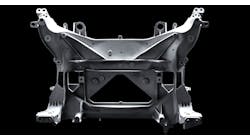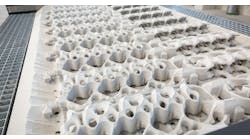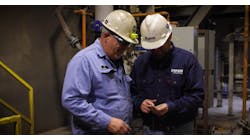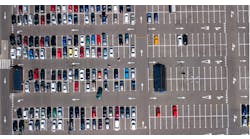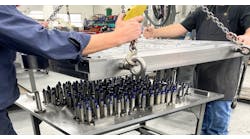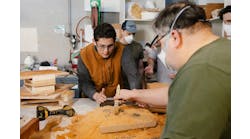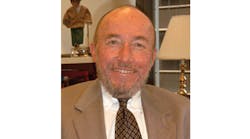Each year since 1992, the FOUNDRY Management & Technology Hall of Honor has identified the men and women whose technical and process innovations; organizational leadership; professional and industrial standards; and personal contributions and achievements have improved and enhanced metalcasting as a science, as an industry, and as a community. Underlying this effort is the assumption that the metalcasting industry needs reliable institutions to support and strengthen it. And, that these institutions need individuals to maintain them, and to ensure they endure for subsequent generations. For the metalcasting industry, for 117 years, one such institution has been FM&T. And, for most of 40 years, the man who strengthened and maintained FM&T was David H. Shanks.
Some metalcasters have a family connection to the industry, or their interest is sparked by their education, or early job experience. Dave Shanks was a U.S. Army veteran who recalls he was working for a job-placement firm in 1969, when he found a job that “looked right” for him — as a Market Research Analyst for FOUNDRY Management & Technology. “At that time, FM&T had over 20 employees including seven editors and six sales people,” he notes. It reflected all the variety of the industry at that time.
The role of the magazine was, and is, to report on the developments and circumstances surrounding foundries, diecasters, the markets that they serve, and those that serve them. Right away, Dave came to be familiar with metalcasting, the industry’s operations and its suppliers, their capabilities, and their interests. “My first assignment was to conduct an advertising readership study to measure the readership of individual advertisements. I also started working on our extensive ‘Inventory of Foundry Equipment,’ a lengthy and involved process that documented the number of all types of equipment used in foundries.”
Dave was gathering information, but he was building an understanding. “I had several early impressions of the foundry industry. One was (and still is) the importance of castings to our national economy: The fact that over 80% of all durable goods contain castings to some degree; how virtually all aspects of our day-to-day living rely on castings; how the infrastructure of our country and all of our modes of transportation rely on metal castings; and, having recently served in the military and starting at FOUNDRY during the Vietnam war, being aware of the critical importance of castings to our country’s defense.”
Needless to say, Dave was developing an appreciation, too, for the fact that among all the people he met, for all their different objectives, “there was a feeling of ‘family’ about this industry, a feeling that ‘we are all in this together even though we compete with each other.’ In addition to advancing individual companies, there was a desire to advance the foundry industry as a whole.”
As examples of this, Dave points to the professional and social efforts with groups like American Foundry Society, Steel Founders’ Society of America, Non-Ferrous Founders Society, Casting Industry Suppliers Assn., and the numerous state cast-metals associations. “The synergy and interdependence between casting producers and suppliers to foundries has had a lasting impression. While suppliers rely on foundries for their livelihood, it has been documented that the majority of technical advances in the foundry industry have been supplier driven.”
Though he became a member of this community somewhat by chance, Dave devoted himself to it professionally and personally all the same. He joined many of those same organizations. Over the decades he represented FM&T to the industry as a regional sales representative, national sales manager, and eventually as publisher.
The magazine’s fortunes paralleled those of the metalcasting industry, but it was continually strengthened by the relationships Dave built and the integrity he imparted. “He was well liked by his peers and competitors,” one leading equipment builder confirms. “He is a straightshooter, a gentleman and great example to those around him. Dave cares about the industry, and he had a passion for advertising. He was always eager to help wherever we could.”
A representative of a major equipment contractor confirms, and expands, calling Dave an excellent, professional salesman, and the “greatest friend that I could possibly wish for in the industry. Dave’s guidance and closeness to detail has always inspired me.”
These are the reflections of colleagues, but also friends. Theirs were relationships that formed in business, but that were strengthened and supported by Dave’s interest in their work and the genuine affection he demonstrated — and earned in return.
“I think Dave is an all-around great guy, a class act,” the equipment builder told us. “Whether it was work-related or playing a round of golf, Dave made the experience enjoyable. Dave is very knowledgeable, and he always shared his good ideas with me.”
Dave retired in 2008, and continues to enjoy life and friendship. His retirement affords more time for golf and Harley riding, and for the company of his wife Bobbi, their children and grandchildren.
Dave’s retirement preceded the financial crisis of 2008, but that event now puts the preceding decades in sharper contrast. “Dave was from the old school, which meant you were a client and a real person to him, not just a number on a computer screen,” explains one of our sources.
There are reasons to wonder if the “family” way of doing business can be maintained. Operating costs continue to skyrocket; operating margins get narrower. Technology replaces individuals, and organizations become global, rather than regional. Dave acknowledges his concerns on this matter, too.
But, the metalcasting industry is an ancient institution. It predates us by thousands of years; it will continue in some fashion for thousands more. And, for those who devote the best of themselves to it, who improve the industry by their complete efforts, who will share the best of themselves with their colleagues, metalcasting will reward their investment. We have known one man who exemplified this for us, and so we’re proud to add David H. Shanks to the Hall of Honor.
|
Hall of Honor David H. Shanks Publisher, Foundry Management & Technology
Hall of Honor Inductees 1992 CHARTER INDUCTEE* DECEASED |
